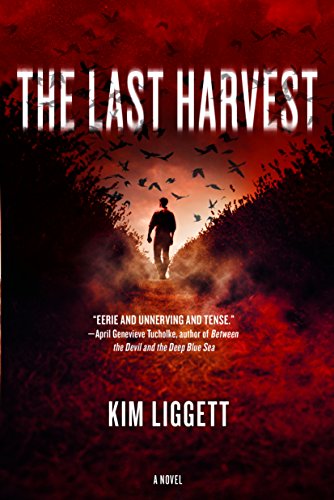
![]() The Last Harvest by Kim Liggett
The Last Harvest by Kim Liggett
YA horror novel The Last Harvest (2017) focuses on hidden secrets within a small town and the unreliability of one’s senses. Taking a page or two from Ira Levin’s classic novel Rosemary’s Baby (1967) and clearly inspired by instances of “Satanism-related moral panic,” Kim Liggett serves up a tale of teenagers inheriting a dark legacy — and whether that legacy is mental illness or something more sinister is at the core of her story.
One year ago, Clay Tate’s father died in the process of trying to destroy the entirety of the breeding stock at a local cattle ranch … using a crucifix. Mr. Tate had been acting erratically for a while leading up to that night, but no one suspected that he was capable of such senseless violence. Now Clay avoids his former friends, ghosting his way through his senior year of high school and spending nearly every waking moment trying to bring in the wheat harvest his family desperately needs to keep them afloat. His mom drifts in and out of reality, his middle sister Jess hangs out with the wrong crowd, and youngest sister Noodle deserves a better education than they can afford. As the anniversary of Mr. Tate’s breakdown draws near, strange and awful events begin happening, but only when Clay is around. By the time he can get someone else to the scene of the latest slaughtered animal or ritualistically-painted teenagers, all evidence has vanished. Is Clay losing his mind, or is something much more terrible plaguing his formerly serene small town?
Midland, Oklahoma is presented in all the glory that the idea of “rural heartland America” can evoke: near-religious objectification of high-school football, a focus on the “right people” (the richest, the whitest, the ones directly descended from town founders) being in charge of local governance, and a rigidly-enforced social code. The setting itself held more unease for me than the circumstances, frankly, and contributed greatly to the overall atmosphere of distrust and fear permeating Clay’s worldview.
Clay, as The Last Harvest’s central figure, is the most fully-realized and believable character, especially as he flounders through episodes of terror and self-doubt. Establishing a family tendency toward mental illness adds to the sense that Clay’s reactions to strange events might be erroneous, and moments that he sees as sinister might be completely safe. As the former star quarterback-turned-withdrawn loner, his sudden isolation from society has an obvious effect on the people he used to consider friends, and clearly affects him in negative ways. His devotion to his remaining family members is admirable, and his interactions with Noodle are charming. By comparison, the other teenagers are a little one-note, fitting neatly into expected roles of “competitive antagonist” or “childhood sweetheart” with little depth or deviation from type.
Liggett does a good job of cementing the reader firmly in Clay’s train of thought, showing us the good person he tries to be while coloring his interactions with classmates and adult Midland residents with a strong dose of mistrust and paranoia. Even when things go from a little strange to outright bizarre, she allows the reader to doubt Clay’s perceptions of reality for a long time before finally revealing what’s really going on. If you have any background with horror tropes, the big reveal may not hold much surprise for you, but the way Liggett gets there is interesting and entertaining enough to propel you past familiar touchstones.
The Last Harvest would be a great introduction to the horror genre for teenagers who aren’t familiar with its inspirations and predecessors. It definitely contains some mature themes, so I’d reserve it for readers who are okay with sexual situations, Satanic rituals, and underage use of drugs and alcohol. Recommended, but with some caveats.



It would give me very great pleasure to personally destroy every single copy of those first two J. J. Abrams…
Agree! And a perfect ending, too.
I may be embarrassing myself by repeating something I already posted here, but Thomas Pynchon has a new novel scheduled…
[…] Tales (Fantasy Literature): John Martin Leahy was born in Washington State in 1886 and, during his five-year career as…
so you're saying I should read it? :)